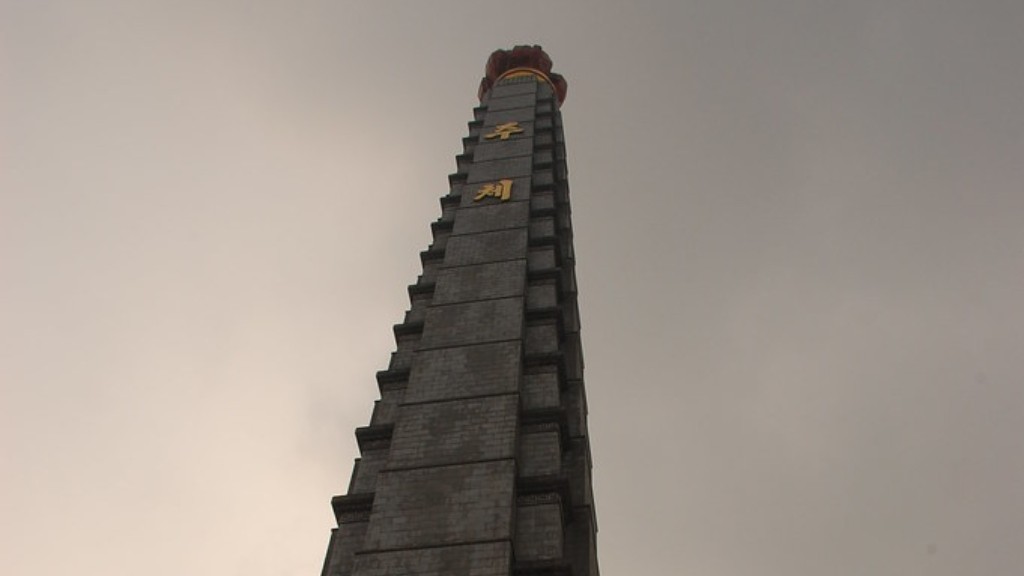North Korea’s Military Capability
On the surface, North Korea seems to possess the means to take over the United States. The country is home to over a million active soldiers, a vast array of tanks, fighter jets, and artillery; and is known to possess a substantial number of possible nuclear weapons. Despite these outward displays of power, there are several fundamental weaknesses that North Korea would have to overcome in order to successfully mount an invasion of the United States.
Firstly, the US has a nearly impenetrable defensive system—home to the most powerful armed forces in the world. Not only does the US have the world’s largest navy, air force, and number of nuclear weapons, but it also has an extensive intelligence network that monitors some of the most sensitive regions in the world. In addition, the US’s allies—namely, South Korea, Japan, and multiple Middle Eastern countries—would be likely to join forces with the US in repelling any invasion from North Korea, likely stymieing any successful invasion from the outset.
Secondly, there is doubt in the international community that North Korea has ready access to weapons sufficient to overpower the US, even if an attack was mounted. According to United Nations’ estimates, North Korea has a “no more than 10” nuclear warheads—far fewer than the vastly more powerful US’s reported arsenal of 1,372 nuclear weapons. Moreover, North Korea’s nuclear technology is widely considered to be a generation behind that of the US—meaning that there exists a substantial capability gap between the two countries.
Finally, North Korea is severely limited economically and technologically. Its economy is one of the most isolated in the world—dependent almost entirely on assistance from China —and its technological capabilities are widely believed to be approximately two generations behind those of the United States. A single US stealth bomber is so advanced that it could likely penetrate the entirety of North Korea undetected, let alone any branches of the US military.
North Korea’s Political Isolation
On top of these important geopolitical and military considerations, North Korea is also politically isolated from the international community. The country is the only nation to have conducted nuclear tests in the past decade, a move which has led to increasingly strict international sanctions and isolation from key states. In 2017, China—North Korea’s closest ally and only major trading partner—agreed to additional United Nations’ sanctions on North Korea, significantly limiting its ability to access money and critical resources.
North Korea’s relationship with the US and the rest of the world has only deteriorated since the election of Donald Trump in 2016. During his first term in office, Trump clashed repeatedly with North Korea and its leader, Kim Jong-Un, and made repeated attempts to pressure Pyongyang into relinquishing its nuclear weapons program. Trump also enacted a range of increasingly strict sanctions on North Korea, in an effort to restrict the flow of national resources to the country.
The US also maintains a rotational presence in South Korea as part of a combined defense strategy known as the “tripwire deterrent.” Under this system, US forces are stationed on the Korean Peninsula, ready to immediately counter any aggression from North Korea. This defensive scheme has been highly successful, as US forces have deterred multiple instances of North Korea’s aggression since its unveiling in 1987.
The increasing isolation of North Korea—both militarily and politically—makes it seem highly unlikely that North Korea could successfully mount a takeover of the US in the near future.
The Role Of China
While North Korea would face significant resistance from the US and its allies if it attempted a takeover, there is a potential force multiplier—China. Despite increasing international pressure and the recent enactment of several UN sanctions, Beijing is still considered to be a major ally of North Korea and is believed to supply Pyongyang with much of the necessary resources and technology to maintain a functioning state. Without China’s support, North Korea would be crippled economically and unable to continue its current level of military expenditure.
Moreover, China is far less likely to take action against North Korea if it decides to mount an aggressive military campaign—namely, a takeover of the United States. This is because while the United States is an important ally of China and a major commercial partner, China has much more to gain from staying in North Korea’s good graces. In particular, North Korea provides a strategic buffer zone between China and US forces stationed in South Korea.
In this sense, China is identified by many experts as one of the primary blockers of the US’s plans to contain and undermine North Korea. Without China’s support, any invasion by North Korea would likely fail from the beginning due to lack of resources and support. However, even with China’s support, the odds of North Korea successfully taking over the US are still slim.
Public Opinion
Despite the US and North Korea’s rocky relationship, public opinion of the US in North Korea is surprisingly positive. According to a Gallup poll conducted in 2018, a vast majority of North Koreans (89%) view the US favorably, with only 10% viewing the US negatively. North Koreans generally attribute this positive view of the US to the fact that most citizens of the country have no direct involvement in their government’s decisions and, instead, seek to distance themselves from the inconsistency of the country’s leaders.
This public opinion is further bolstered by North Koreans increased awareness of the outside world. Despite its lack of internet, North Koreans have managed to gain access to information from the outside world through media such as TV, music, and movies. This, in turn, has changed their views of the US from viewing it as an enemy to viewing it as a source of hope and aspiration.
It is clear that the US is still seen as a leader in the international community by many in North Korea, and this sentiment could very well be a deterrent for any potential takeover. If North Korea can convince its citizens that a takeover of the US would be for the benefit of the entire world, then it might become a much more viable possibility.
Parting Thoughts
It is important to remember that while North Korea may have the potential to take on and defeat the US militarily, there are several factors that would prevent the country’s ability to do so. These include a lack of resources, public opinion in North Korea, and China’s refusal to assist in any conflict. Additionally, the US’s modern military, intelligence network, and allies make it nearly impossible for North Korea to mount a successful attack. While it is not impossible for North Korea to take over the US, it is highly unlikely.
US Countermeasures
in the face of heightened tensions and North Korea’s escalating military capabilities, the US has been forced to respond in kind. under president trump, the US military has increased its own readiness and capabilities, particularly in the Pacific. most recently, the us navy has increased its presence in the region as part of the trump administration’s “freedom of navigation operations.” these operations are aimed at protecting us interests in the region and deterring North Korean aggression. the us navy has also been increasing its maritime surveillance capabilities, utilizing unmanned aerial and maritime vehicles to ensure it has the capability to track North Korean vessels.
in addition, the US has embarked on a comprehensive diplomatic campaign to persuade the international community to impose stronger economic sanctions on North Korea. recently, the US has managed to forge closer ties with China and other powers in the region in order to bring about continued economic pressure on Pyongyang. the US also plans to raise the issue of North Korea’s human rights violations with the United Nations security council, which would further impede North Korea’s access to international resources.
North Korean Diplomatic Tactics
in response to these US countermeasures, North Korea has adopted an increasingly calculated diplomatic strategy. having realized that direct conflict with the US is not a viable option, North Korea is utilizing diplomatic channels to attempt to gain international favor. in particular, North Korea has been trying to build bridges with the US through its “new diplomacy of peace”. recently, North Korea’s foreign minister ri yong ho visited new york, where he gave a speech wherein he claimed that North Korea was open to pursuing diplomatic solutions instead of military action.
in addition, North Korea has also attempted to court international support by delivering aid to its neighbors. in 2017, North Korea delivered a shipment of food to south korea in a move seen as both a sign of goodwill and a tactic to curry favor from south Korea’s government. simultaneously, North Korea sought to assuage international fears of its nuclear capabilities by announcing its willingness to freeze its nuclear weapons program. however, these diplomatic tactics have had limited success in corralling international support for North Korea.
North Korean Weaponization
in a further attempt to gain leverage over the US, North Korea has been researching and developing new weapons of mass destruction to add to its arsenal. recently, North Korea has increased its focus on the development of biological and chemical weapons, leading the us intelligence community to conclude that North Korea is well on its way to becoming a biological weapons state. this has led to a considerable sense of unease in the international community, as one of the US’s primary defense strategies–a defensive missile shield system–would be useless against biological weapons.
currently, North Korea is believed to possess a rudimentary biological weapons program. however, US intelligence agencies have warned that this program could be quickly ramped up, with devastating implications for the US and its allies. though not as militarily powerful as nuclear weapons, the threat of biological weapons provides North Korea with yet another way to leverage the US into diplomatic negotiations.
North Korean Cyber-espionage
in addition to conventional weaponry and diplomatic tactics, North Korea has also begun utilizing cyber-espionage as a tool to gain access to US secrets and information. North Korea is believed to have initiated a number of large-scale cyber-attacks on US corporations, universities, and even government institutions in an effort to gain access to confidential information and disrupt US networks. these attacks have been partly successful, with North Korea managing to gain access to over 500 million accounts with potentially sensitive information.
in response, the US has increased its cyber-defense capabilities and strengthened its cyber-security infrastructure. the US is also working to forge closer ties with allies in the region, in an effort to improve the ability to detect and mitigate cyber-attacks from North Korea. however, it remains to be seen how effective these measures will be against a determined and sophisticated adversary such as North Korea.





